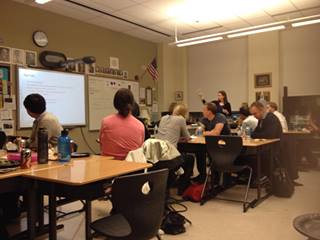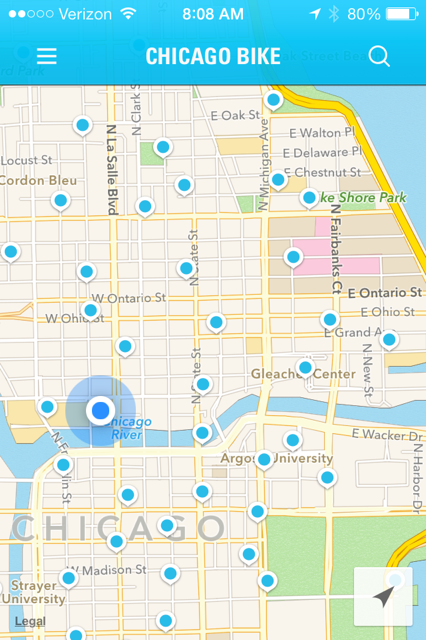Entrepreneurship
Exactly one year ago. Seth Godin. And working on a project that mattered. [Video]
 Exactly one year ago,   I spent two weeks working with Seth Godin and 15 other extraordinares.
I spent two weeks working with Seth Godin and 15 other extraordinares.
Thousand applied to be part of the project (bit.ly/1a8FfZM) and just more than a dozen of us spent two weeks together in New York.
We built things, connected, failed and practiced being generous with the end goal of changing everything. Â We created a beautiful business model, designed a platform, launched a minimum viable product and most importantly learned a lot from one of the foremost business gurus in the world.
Reflecting back from a 10,000 foot view, here are a few of the takeaways that stick with me a year later.
1.  Kindness.  Seth is one of the smartest people I’d ever met.  And just as importantly one of the kindest people I’ve ever met.  Seth not only gave us complete accessibility to him and his house and office, but also spent full days with us the entire time.  He cooked us meals, shared his ideas, invited busy friends of his to come connect with us, gave us all the resources we could ever ask for and genuinely connected with us.
2. Â Create art. Â This project, like all of Seth’s projects are art. Â They are used to create change and with the hopes of doing something that matters. Not to make money.
3. Â Have a point of view. Â Seth pushed each and every one of us to stand up and taken a stand. Â In the end, it became very clear that it’s far more important to sustain an argument than it is to write and memorize facts. Â And to do that in front of people whose opinions you care about.
4. Â Stop hiding and ship. Â Most of us spend a lot of time hiding. Â Not sending out our work, not sharing our ideas and afraid to put stuff out into the world. Â This is the resistance. Â Seth encouraged us to stop hiding and to “ship”. Â To show our work, get feedback, share and connect with others. Â All 3,000 of your Facebook friends will still like you no matter how it turns out.
5.  Find the critical path.  According to Seth, “The longest string of dependent, non-compressible tasks is the critical path.” Every complicated project has it; a lot of people working on many elements, some of which are dependent on others.  The critical path is the most important variable which many things depend on. Focus on that!
6. Focus on the hard part.  Ask yourself, What’s hard? Why are you stuck? What’s in the way of where you are now and where you want to go?  And talk about it openly and honestly. Then leap forward.
7.  Rush early, not late. It’s better to set aggressive deadlines early.  To change, change again and change again when you’re starting out. It’s cheaper that way.  The cost of changing is lower.  And it’s better for your peace of mind.
8.  Shun the skeptics. There are a lot of people who won’t believe in your idea no matter what.  They’ll encourage you to give up or do something that’s safe.  The best way to deal with skeptics is to ignore them.  And for the thoughtful generous skeptics, the best thing to do is to understand their point of view, explore why they believe what they believe, and then decide what you want to do.
9. Â Go. Go. Go. Â Get to work. Make things that matter. Make a difference. Â It won’t happen if you don’t start now.
Here is a video recap on the final day with tidbits from the team members (from http://vimeo.com/72428593).
Secret office
 I just got back from a trip to Costa Rica. The trip was extraordinary. Not only because the country is beautiful and the weather was warm but also because I thought more about my secret office.
I just got back from a trip to Costa Rica. The trip was extraordinary. Not only because the country is beautiful and the weather was warm but also because I thought more about my secret office.
The office isn’t Costa Rica, and it’s also not the beach.  But instead it’s getting out of the office. Stepping away from emails. Being out in the country. Being away from the hustle and bustle and instead being at the beach and the mountains.
In those places, it’s like having my own office. More time to think and write. Spending time  with the best company. Having the best views and the best time to think. And of course having time to meditate and do more yoga.
Instead of writing emails to clients, I wrote blog posts, scribbled in my journal, and took photos. I caught up with friends and did yoga in the sunlight.  And in the end I felt renewed and had more ideas than ever.  I even started the blog for Yoga 100 (and now have a lot more participants) and managed to come back to happier … all while having an experience I won’t forget.
In short, we are often very productive at work and at home. But sometimes, it’s good to change things up and find your secret office. Sometimes you can get more done than ever, all in just a few hours, and spend the rest of the time enjoying the trip.
Just a thought.
(This is a view from my office in Costa Rica)
Revive the Dream: Session 2 with Micki O’Neil
 Earlier this week, we hosted the second Revive the Dream seminar. Our Fellows were lucky to spend the evening with charter school founder and former Teaching Fellow, Micki O’Neil.  The issue we discussed, is whether kids in charter schools are better off than kids in traditional public schools.
Earlier this week, we hosted the second Revive the Dream seminar. Our Fellows were lucky to spend the evening with charter school founder and former Teaching Fellow, Micki O’Neil.  The issue we discussed, is whether kids in charter schools are better off than kids in traditional public schools.
The debate is a good one. Some people argue yes, pointing to top charter schools in Chicago, such as KIPP and Noble. Likewise, people also point to the higher average high school graduation rate. On the other hand, there are also others who argue that kids are not better off in charter schools as a whole, arguing that there are more bad charter schools than good ones, that there isn’t enough data to demonstrate college graduation or general success, and that student performance on tests and homework in chartersoften times isn’t any better than their public school counterparts.
About a year ago this panel discussed the issue.  It’s worth the watch if you have an extra hour. The panelists ranged from the President of the Illinois Charter Network (“INCS”), who you might guess was an advocate of the charter system, to a member (or former member) of the Teachers’ Union, to Professors Charles Payne a more neutral voice, from the Unviersity of Chicago.
Thanks to Micki for graciously accepting our invite to visit and talk in more detail about the charter debate as well as discuss her model at the charter school she recently founded, Foundations College Prep.
Here are a few photo shots from the session.
*This is Micki discussing her charter model at Foundations Prep
* This is Micki presenting stats on charter schools versus CPS
Divvy: Bike share in Chicago
 Less than a year ago, the city of Chicago rolled out a citywide bike system called Divvy. As you walk around the city, you see bike stations that look like the one below in the post. I took one for the first time a few days ago.
Less than a year ago, the city of Chicago rolled out a citywide bike system called Divvy. As you walk around the city, you see bike stations that look like the one below in the post. I took one for the first time a few days ago.
I walked out of an Applie Pie Contest with friends in Bucktown feeling full, and was ready to get back to River North for an evening yoga class to work off the food. But there were no cabs immediately around and public transportation from Bucktown to River North isn’t great. The subway and the bus ride both require  a switch and that can be tricky if you don’t time it right on the weekends. So I took out my phone, downloaded the Divvy app, and looked to see if there was a station close by. Of course, the moment I put my head up and started looking around, I saw one less than a block away before the app was even downloaded.
It works a lot like a public transportation system. You pay a small fee and can get a bike for a full day. You can pay for it right the kiosk. Then pick what number bike you want. When you pull the bike out of the rack, it’s yours to ride.  You can take it anywhere you want, so long as you dock it in any station when you’re done (like RedBox). When you arrive at your desination, you just put the bike back in the rack and it locks itself. And best of all there are lots of locations around the city as you can see in the photo below.
The bikes felt really secure and sturdy. They also have a built in lock system so you can lock it up. They’ve got gears, sturdy breaks, and a basket for shopping.
There are probably some safety concerns. I didn’t have a helmet on me. Any entrepreneurs out there that want to work on an inflatable helmet that fits in my pocket? I’d totally fund the idea. I had a friend tell me she had an extra, but I was already biking by that point. Likewise, cars and cabs can be tough on roads with smaller bike lanes or roads without a lane. But ever since the roll out of Divvy, a lot of roads have put bike lanes up so I did my best to stay on roads that felt secure.
In th end I made it home fast, safely and on time to make the class. While public transit is sometimes the best way to get around, sometiems Divvy is easier.  And best of all, it was an awesome ride!
New beginnings
 People all over the world crave new beginnings. But ironically, most people also do everything they can to avoid them.
People all over the world crave new beginnings. But ironically, most people also do everything they can to avoid them.
The lawyer who slaves away at her job for an extra few years because she likes her salary and doesn’t know what to do next. The middle manager who is comfortable with the day to day routine which he thinks he can’t find anywhere else. Or the aspiring journalist who chooses to stay at a big company instead of working in the small town in Iowa for the chance to finally make it on air. This is because new beginnings are hard and uncertain.
But new beginnings are also the best opportunity you have to change everything. They give you a sense of hope and rebirth. They remind you that more in the world is possible if we just look up. And they remind you how good you are the moment you break out of your routine.
That’s why we celebrate them on new years and new birthdays.  It’s why we get excited to start over in school again, or start a new job after school. It’s what makes entrepreneurs excited to wake up each and every day.
The ability to do something for the first time. To chance to tackle the problem that everyone else said would not work.
Every day in yoga, we approach our practice the same way: with a beginner’s mind. We start every class in “childs pose†and we take our first breath and put our feet down on the mat for the first time. You don’t know how class will go. And sometimes you feel sore, tired, and nervous you might not finish. But every day, you take the first breath, concentrate and more often than not, you not only make it through the hard part, but you also make more progress than you ever imagined. That’s why so many people keep going back.
In short, new beginnings sometimes give you the opportunity to change everything.
Nothing is for everyone
 You know this but you ignore it every single time. Â And you always find out the hard way.
You know this but you ignore it every single time. Â And you always find out the hard way.
If you’re fundraising for Catholic Extension in Chicago, you have to ask yourself, why does it matter what the atheist next door thinks about your phone strategy?
If you’re a marketing executive at Target, why does it matter what loyal shoppers at Neiman Marcus think about your new products?
Or if you’re applying to college from the poorest schools in one of the poorest neighborhoods in the world, then why are you trying to please the admissions committees from colleges who don’t care about your story.
We all know this but we always seem to forget, that nothing is for everyone.
Think about it. The vast majority of people in the world have never sat in a Starbucks and never used an Android. Likewise the vast majority of people in many parts of Asia do not have indoor plumming.  The numbers show this very clearly.  Just because you have it, doesn’t mean everyone else does.  And the sooner we understand this, the more time we can spend focusing on ways to have more impact in the world by pleasing the people who do care.
In the end, you’re more likely to succeed if you say, this is what I stand for. And this is what I believe. If it’s not for you, then I’ll find the other people who believe in my story.
In short, ignore the skeptics. And spend more with the people that believe.
Pattern Recognition
 One of the most important things I noticed working with Seth Godin over the past week was the importance of patterns. This idea was also pointed out by one of the team members Josh Long.
One of the most important things I noticed working with Seth Godin over the past week was the importance of patterns. This idea was also pointed out by one of the team members Josh Long.
Every time we had an idea or posed a question, you could see Seth thinking of patterns. Patterns in people, patters in markets; patterns in the future. We try to hedge our bets with information and analysis, but more often than not it comes down to gut feel – that intangible pattern recognition that tells you that your next project could be a big winner.
One pattern Seth discussed was how people look at risk. Â He noted that the pattern that many people attempt to fail small. Â Â At the last minute, we all take a step back and take that compelling elements out of our work because it’s safer to fail small. Â He noted it not only in individuals but also in groups.
Another patten he discussed was the concept of barriers. On one hand, he noted that successful people get out of dead ends quickly. They see when a project won’t succeed or when the team isn’t right, and they back out before the going gets tough. Â But on the other hand, there is a really big reward for getting through the big barriers. Â If you are working on the right things and can get past the barriers in front of you, then you can become the best in your field.
In addition to patters in people he also noted patters in the way the world works. Â Through frameworks like scarcity, choosing yourself (a Seth concept) and generosity. Â Also, the ability to take a stand for what you believe in and have a point of view. Â Every suggestion anyone in the room made, Seth continually asked, what do you think? Do you have a point of view? All to lead us down the path of making a decision, not just endless discussion.
Patters are good because they help you understand the issues, pick precise words to describe them, and communicate your ideas with the masses for change.
The Art of Bravery
 Bravery is indeed an art. In the words of one of my favorite authors, Seth Godin, “an artist is someone who uses bravery, insight, creativity, and boldness to challenge the status quo. And an artist takes it personally.â€
Bravery is indeed an art. In the words of one of my favorite authors, Seth Godin, “an artist is someone who uses bravery, insight, creativity, and boldness to challenge the status quo. And an artist takes it personally.â€
Having had the opportunity to work with Seth this week, I agree that the message is spot on.  And even though may of us agree with the message, at times we do still experience fear. We don’t always take the risk worth taking, don’t always push the envelope worth pushing, and don’t’ always make the call worth making. Even though we know it could change everything.
That’s why being brave is an art and not about being fearless. It’s about knowing fear is there and somehow figuring out how to move past it.  Somehow channeling your inner artist to use insight and creativity to get past what you feel right here, right now.
It’s about finding the precise words to push back when you had a point of view. Â Connecting the dots of your intuition to speak up when you feel strongly about the issues. Â Channeling your most visionary ideas to keep going when it seems like It’s not worth going any further.
When we decide to allow fear in,  we let it become stronger. We’re less likely to share our generosity with the world. And less likely to act, even when we should.
On the other hand, if we think bravely, we have the opportunity to do something that could change everything.
The simplest but most effective marketing strategy
 Do you want to know the simplest, but perhaps most effective marketing strategy?
Do you want to know the simplest, but perhaps most effective marketing strategy?
You probably have a lot of potential answers, but I only have one in mind.
You may not want to ask MBAs. MBAs will probably use analysis to give you a good answer. Â MBAs will tell you how to size the market. Â They may also tell you how to estimate your budget based on lots of numbers. But this usually doesn’t help with getting people to buy what you have.
It might also be risky to involve lawyers. They’ll tell you about all the risk and about all the potential litigation.But you don’t need that skill to be successful.
I propose that the best method to market is simply to care deeply.
I told you it was simple.
In short, care about WHAT you do and more importantly WHY you do it. Â Care about the customer. Care about being generous and giving the customer the best experience you can. Â And care about the story. Â You don’t need a degree to do that, though the experience of getting the degree probably helps you understand others better. Â But in many cases emotions, hard work, and a compelling mission will go a long way.
Just a thought.
Hard Work > Working Hard
 Today was filled with a lot of really hard work. Not to be confused with the fact that we were also working hard
Today was filled with a lot of really hard work. Not to be confused with the fact that we were also working hard
“Working hard†is what we do every day. For me it’s usually billing more hours than I can count for weeks at a time. I’m sure many of my readers have similar experiences at their jobs.
But “hard work†is what we do when we work on gamechanging ideas together. Bringing a team of lots of people together to discuss disjointed ideas, debate different points of view, mesh our worldviews, and take a stand about an idea. And often we are charged to do all of this without any framework, structure or leaders in the group.
Working hard is not new. We all know how to buckle down and work hard. But hard work flexes an entirely different muscle. Because it’s difficult adapting to having more cooks in the kitchen, navigating a setting where at times it might be hard to speak up or propose an idea, wondering how many others are still not convinced with the concept, and skeptical whether you can actually make a difference. I have felt all of these things over the past day or two.
It always takes a lot more hard work (and perhaps a lot more risk) than working hard to answer these and other hard questions. This is why is so important to be part of not just a talented team but also a “good team”.
Three More Days
 Three more days. Â Yep, that’s it. Â In three days, I’ll be working with a small group of people from all over the world, and we plan on doing something very special.
Three more days. Â Yep, that’s it. Â In three days, I’ll be working with a small group of people from all over the world, and we plan on doing something very special.
You must be dying to know exactly what this means?
What this means is that folks with game-changing ideas are coming together to work with a common purpose and to work for a common cause. Â That purpose is to create something remarkable and in this case, the cause is related to education and the internet. Â In just a few days, I’ll be joining Seth Godin, and his hand selected team.
In terms of what we’ll do, good question.  We’ll have discussions to see if we can up with a few ideas, maybe draw out a game plan, perhaps create and launch a product, and possibly even strategize on how to raise capital.  Who knows.
On one hand, the details are not all determined yet and that’s why the team is going to be important. On the other hand, we have to be quiet about what we are doing until we’ve done it.
But soon, that may not be the case. Â So stay tuned. I look forward to sharing our progress with you.
Ignore the Skeptics
 “There’s no way you are going to be able to do this. It’s too hard to get that job.  You don’t have the right background. It’s impossible to make it work.
“There’s no way you are going to be able to do this. It’s too hard to get that job.  You don’t have the right background. It’s impossible to make it work.
We’ve all heard these words before. From skeptics and non-believers. People who don’t think we can do it. It makes many of us feel like we can’t. And like our work may not amount to anything.
But here’s the thing. Most skeptics don’t care enough to form a real opinion, and they don’t care if you succeed or not. They’re also often wrong.
The skeptics were wrong when they said that it was impossible take thousands of pounds of steels and fly it over the Atlantic. They were wrong when they said you couldn’t flip a switch and make an entire buliding light up. And they were wrong when they said that the Internet would never amount to anything. Time after time, skeptics have been proven wrong.
Don’t get me wrong, it’s tough to ignore the non-believers. The negative words get to you. You keep a mental list of the names of those who said it and the things they said. The ones who laughed at your business idea and questioned your choice to apply to a top school.
But what if the skeptics were wrong again?  What if you ignored them?  And what if, instead of thinking so much about what the skeptics say, what if you just ignored them and did it anyways. And what if it worked?
Just a thought.
MBA Mondays: Starting a Business
 Many of my friends from business school have started businesses. Â Far more of them will fail than succeed, but that’s just how the numbers work. But some will be successful and some will even be wildly successful. Â But all that feels so far away the moment you are getting started.
Many of my friends from business school have started businesses. Â Far more of them will fail than succeed, but that’s just how the numbers work. But some will be successful and some will even be wildly successful. Â But all that feels so far away the moment you are getting started.
It’s not always clear what to do when you first want to start a business. Â Most people think about writing business plans but it’s not always clear why people do that either. Don’t get me wrong, business plans are useful to organize your thoughts and present your ideas to future teammates and investors. But they don’t usually make an idea better, and they certainly don’t give a bad idea more sales.
Over the last few days, I’ve been thinking about four other things that matter a little more.
1. Â Money
2. People
3. Advisor(s)
4. Overcoming fear
5. Formalities.
In the legal world, we help business people work on formalities. Â We help determine organizational structure. Â We organize the companies, file the paperwork and ensure they are in compliance with state law. Â We help them formally create rules, which are known as Bylaws and we help them elect managers of the company, which you know as officers and directors. We do this far more seamlessly and quickly than they could by themselves.
When we do this we also help with the money and people part, where we help draft agreements when a company wants venture investments or wants to hire employees or contractors. Â We also draft agreements when the person or company wants to give equity in the company to employees or investors.
This is important because the business side of money and people are critical.  All companies need budgets and deadlines and sales to be successful. They need to make more money than you spend but have to analyze cash flows, balance sheets, margins and return on investments to measure their success.  Many lawyers run as fast as they can from these things but the good ones speak the language very clearly and help business people incorporate them into their overall plan. To structure the incentives and all the agreements the company has to fit its financial strategy.
But none of this is possible unless you work with people that are smart and compliment each other. Â This is the people element. This doesn’t always mean their resume, though a resume can be a good indication of what someone will contribute. But it also means their passion, attitude and track record.
Most service providers understand their element pretty well, but not the entire process. Lawyers, tend to see the legal side. Consultants know the operations or strategic aspect. And bankers tend to get the numbers. Â VCs think through much of this stuff pretty well too. Â But the advisor is the person that understands all of the elements. And the more of these an entrepreneur has, the more he or she will overcome the fear of starting the business.
Just a few thoughts, as I’ve been working a lot of the Formalities part recently. Â It’s a big topic for one blog post. Much more to come.
#EducationMatters
Please Vote
Recent Posts
Twitter Feed
Disclaimer
| S | M | T | W | T | F | S |
|---|---|---|---|---|---|---|
| « Jun | ||||||
| 1 | 2 | |||||
| 3 | 4 | 5 | 6 | 7 | 8 | 9 |
| 10 | 11 | 12 | 13 | 14 | 15 | 16 |
| 17 | 18 | 19 | 20 | 21 | 22 | 23 |
| 24 | 25 | 26 | 27 | 28 | 29 | 30 |











